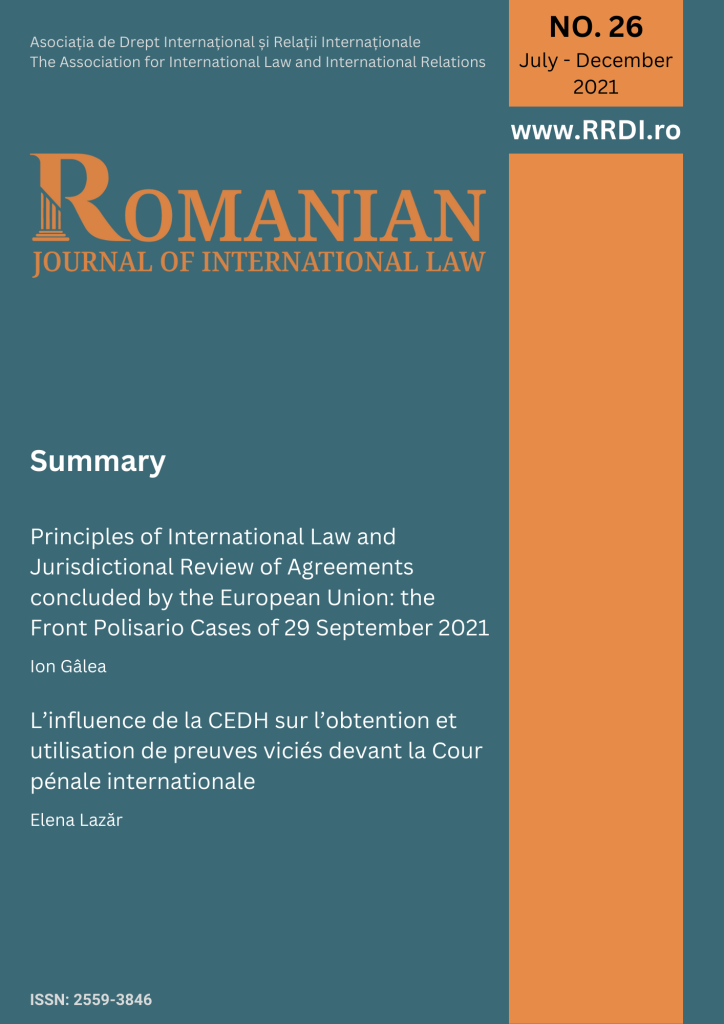L’influence de la CEDH sur l’obtention et utilisation de preuves viciés devant la Cour pénale internationale (The influence of the ECtHR on obtaining and using tainted evidence before the International Criminal Court)
Elena LAZĂR
Les éléments de preuve représentent un point essentiel de tout processus pénal. Puisque l’obtention de preuves constitue un domaine qui fait l’objet de l’activité de tout tribunal, pour les besoins de cet article, nous analyserons dans quelle mesure la jurisprudence sur les droits de l’homme sert de base aux décisions de la Cour pénale internationale et quelles sont les conditions et les situations qui attirent au niveau théorique et pratique l’applicabilité de la règle d’exclusion des preuves altérées.
Challenges to Black Sea Governance. Regional Disputes, Global consequences?
Carmen ACHIMESCU, Viorel CHIRICIOIU, Ioana OLTEAN
The Black Sea is a strategic crossroad between Europe, Middle East and Asia, but it is also an area dense with frozen and “defrost” conflicts. In recent years, the coastal states have faced numerous difficulties involving sovereignty, annexation, exploitation of resources and armed conflicts. The states are also members of different organisations and positioning towards the European Union and NATO has not been constant, especially with the added pressure of the current global situation.
Principles of International Law and Jurisdictional Review of Agreements concluded by the European Union: the Front Polisario Cases of 29 September 2021
Ion GÂLEA
This study has the purpose to examine the judgments rendered on 29 September 2021 by the General Court of the European Union Front Polisario/Council (T-279/19 and T-344/19, T-356/19), from the wider perspective of the European Union case law concerning the territorial scope of agreements concluded between the Union and the Kingdom of Morocco. Thus, the judgments represent a continuation of previous cases Council/Front Polisario (C-104/16P) of 2016 and Western Sahara Campaign (C-266/16) of 2018. In those cases, the Court of Justice of the European Union interpreted ”neutral” territorial clause of two agreements between the EU and the Kingdom of Morocco as excluding the application of those agreements from the territory of Western Sahara. The Court of Justice relied essentially on interpretation in accordance with any other relevant rule of international law in force between the parties (rule reflected in article 31 (3) c) of the 1969 Vienna Convention on the Law of Treaties between States) and invoked the principles of self-determination and relative effect of treaties. Subsequent to these judgments, the EU and the Kingdom of Morocco modified the respective agreements (the” liberalisation agreement” and the” fisheries agreement”) in order to provide explicitly for their application to Western Sahara and its adjacent waters. Thus, the judgment of the General Court of 29 September 2021 were rendered following the action for annulment filed by the Front Polisario, against the decisions of the Council for the conclusion of those agreements.
The study explores the legal questions that were necessarily examined by the General Court, including the locus standi of the Front Polisario, the concept of „people” as subject of international law, the rule „land dominates the sea” and the legal effect of the principles of self-determination and legal effect of treaties. Even if the General Court did not mention it, the study attempts to examine, also, the consequences of the fact that doctrine (including the International Law Commission) and a significant number of States consider the right to self- determination to represent a jus cogens norm.
The International Law Applicable to the Secession of a Territory. Territorial Integrity versus “Neutrality” of International Law and the Role of Self-Determination
Bianca-Gabriela NEACȘA
This article aims at addressing the legality of secession in public international law, building on the two opposing theories proposed regarding the international law applicable to secession. The principles of self-determination and territorial integrity are examined in order to determine their applicability in the context of each theory.
The Concept of “Crime of Terrorism”: the Relevant Case Law of the Special Tribunal for Lebanon
Raluca-Andreea ȘOLEA
The aim of this research is to analyse the elements of the crime of terrorism encompassed within the relevant case law of the Special Tribunal for Lebanon, in comparison with other definitions of terrorism, developed by international bodies. The study also aims at explaining what their relevance for the further development of a common agreed concept of the crime of terrorism is.. As it is well-known, so far, the crime of terrorism, despite its gravity and the threat that it poses to the international peace and security, is not regulated within the international law since the international community could not agree on a common notion of the terrorism offence. Thus, analysing the concepts of terrorism developed is of high importance. Because the Special Tribunal for Lebanon is competent in particular on the crime of terrorism, its case law appears of significant relevance.

